| Srl | Item |
| 1 |
ID:
073772
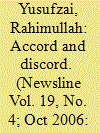

|
|
|
| 2 |
ID:
093189
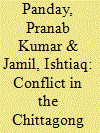

|
|
|
| 3 |
ID:
133940
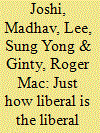

|
|
|
|
|
| Publication |
2014.
|
| Summary/Abstract |
This article assesses the extent to which the liberal peace (the dominant form of internationally supported peacemaking) actually deserves the sobriquet 'liberal peace'. In recent years, an intense debate emerged on this question as critics of the critique of the liberal peace have sought to downplay the dominance of the liberal peace. These debates are interesting but they are mainly based on qualitative analysis supplemented with some case study material, and often rely on assertions rather than evidence. This article seeks to add to this debate with simple aggregate data from the Peace Accords Matrix that is comprehensive and comparative. The article constructs a five-part framework to analyse the liberal elements of peace accords liberalism and then tracks the extent to which the elements of the framework are found in peace accords. Through this examination, it is found that the liberal peace is indeed the dominant form of peace-support intervention, although there are considerable variations in the extent and implementation of the liberalism in peacebuilding.
|
|
|
|
|
|
|
|
|
|
|
|
|
|
|
|
| 4 |
ID:
132804
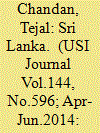

|
|
|
|
|
| Publication |
2014.
|
| Summary/Abstract |
Since the end of the war in Sri Lanka in May 2009, the discourse on Sri Lanka has largely revolved around the country's human rights record and the Government's attempts at redressing Tamil grievances. Revelations in international media about the scale of human rights violations during the last phase of the military operations against the Liberation Tigers of the Tamil Eelam (LTTE) led to mounting international pressure on Sri Lanka for accountability of war crimes. The Sri Lankan Government (SLG), in turn, made efforts to address the issues of resettlement of Internally Displaced Persons (zDPs) and the economic development of war affected zones in the Northern and Eastern Provinces of the country. President Mahinda Rajapakse also constituted the Lessons Learnt and Reconciliation Commission (LLRC) to recommend measures to address the Tamil problem and framed a National Action Plan (NAP) to implement its recommendations. However, key Tamil grievances, related to the devolution of power, remained largely neglected. Attempts at fixing the accountability for human rights violations were also half-hearted. This was evident in the widely publicised Army Court of Inquiry, appointed to investigate allegations of war crimes, which eventually absolved the Army of any wrong- doing'. This in turn, shaped the international opinion on the SLG's willingness to resolve the Tamil problem. Today the prospects for
reconciliation in Sri Lanka are linked to certain key issues. These include (i) Action related to human rights accountability, (ii) Resumption of dialogue between the main Tamil Party, Tamil National Alliance (TNA), and the Government on finding a political solution to the Tamil grievances and, (iii) Preventing the rise of religious intolerance in the country. The contemporary issues with regard to these aspects are discussed in this paper.
|
|
|
|
|
|
|
|
|
|
|
|
|
|
|
|
| 5 |
ID:
133573
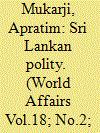

|
|
|
|
|
| Publication |
2014.
|
| Summary/Abstract |
While attention has been justifi ably focussed on the alleged violation of the rights of Sri Lankan Tamils, a true perspective may be gained by including the entire nation in a study of the prevailing situation. Apratim Mukarji believes the unsatisfactory treatment of the Tamil issue is a corollary of President Mahinda Rajapaksa's objective of curbing all other powers and suppressing human rights throughout the country in order to strengthen and perpetuate his rule.
|
|
|
|
|
|
|
|
|
|
|
|
|
|
|
|